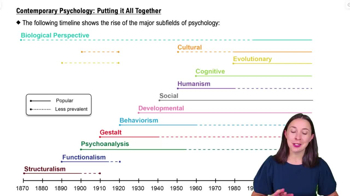Table of contents
- 1. Introduction to Psychology1h 43m
- 2. Psychology Research2h 20m
- 3. Biological Psychology2h 41m
- 4. Sensation and Perception28m
- 5. Consciousness and Sleep32m
- 6. Learning41m
- 7. Memory34m
- 8. Cognition37m
- 9. Emotion and Motivation35m
- 10. Developmental Psychology33m
- 11. Personality48m
- 12. Social Psychology41m
- 13. Stress and Health41m
- 14. Psychological Disorders44m
- 15. Treatment47m
1. Introduction to Psychology
Contemporary Psychology: Putting it All Together
Struggling with Psychology?
Join thousands of students who trust us to help them ace their exams!Watch the first videoMultiple Choice
Ms. Glass tells her students every day how much she wants everyone to succeed, but that they each must choose to attend class and study effectively in order to be successful. She reminds them that the individual choices they make will dramatically affect their outcomes for success. To which perspective of psychology does Ms. Glass's philosophy on academic performance best relate?
A
Humanism
B
Cognitive
C
Psychodynamic
D
Behavioral
 Verified step by step guidance
Verified step by step guidance1
Identify the key elements of Ms. Glass's philosophy: focus on individual choice, personal responsibility, and the potential for personal growth.
Understand the core principles of the Humanistic perspective in psychology, which emphasizes individual free will, personal growth, and self-actualization.
Compare Ms. Glass's emphasis on personal choice and responsibility with the Humanistic perspective's focus on self-determination and personal development.
Consider how the other perspectives (Cognitive, Psychodynamic, Behavioral) differ: Cognitive focuses on mental processes, Psychodynamic on unconscious motives, and Behavioral on observable behaviors and external stimuli.
Conclude that Ms. Glass's philosophy aligns most closely with Humanism, as it centers on the belief in personal agency and the capacity for self-directed growth.

 4:54m
4:54mWatch next
Master Contemporary Psychology with a bite sized video explanation from Hannah Gordils
Start learningRelated Videos
Related Practice




















